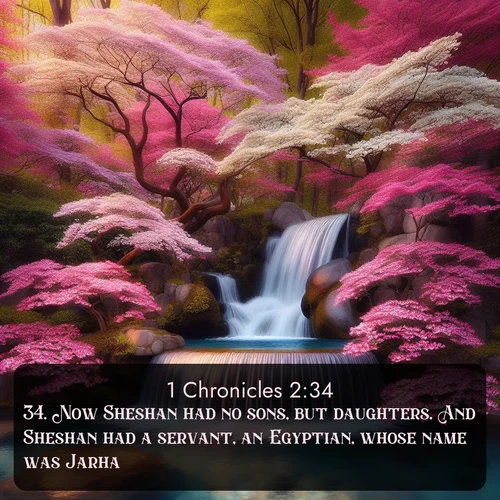1 Chronicles 2:34 plusieurs versions / traductions
English Bible Translations
34. Now Sheshan had no sons, but daughters. And Sheshan had a servant, an Egyptian, whose name was Jarha.
34. Now Sheshan had no sons, but daughters. And Sheshan had a servant, an Egyptian, whose name was Jarha.
34. Now Sheshan had no sons, but only daughters. And Sheshan had an Egyptian servant, whose name was Jarha.
34. And Sheshan had no sons, but daughters; and Sheshan had an Egyptian servant, whose name was Jarha;
34. Now Sheshan had no sons, but daughters. And Sheshan had a servant, an Egyptian, whose name was Jarha.
34. And Sheshan had no sons, but daughters, and Sheshan hath a servant, an Egyptian, and his name [is] Jarha,
German Bible Translations
34. Sesan aber hatte nicht Söhne, sondern Töchter. Und Sesan hatte einen ägyptischen Knecht, der hieß Jarha.
French Bible Translations
34. Shéshan n'eut pas de fils, mais il eut des filles. Il avait un esclave égyptien du nom de Jarcha,
34. Schéschan n’eut point de fils, mais il eut des filles. Schéschan avait un esclave égyptien nommé Jarcha.
34. Schéschan n'eut point de fils, mais il eut des filles. Schéschan avait un esclave égyptien nommé Jarcha.
34. Et Shéshan n'eut point de fils, mais des filles; et Shéshan avait un serviteur égyptien nommé Jarkha;
34. Et Sésan n'eut point de fils, mais des filles; or il avait un serviteur Egyptien, nommé Jarhah;
34. Shéshan n'eut point de fils, mais il eut des filles. Il avait un esclave égyptien, nommé Jarcha.
Versions with Strong Codes
1 Chronicles 2 / KJV_Strong34.
Strong Code definitions
H8348 Sheshan shay-shawn' perhaps for H7799; lily; Sheshan, an Israelite:--Sheshan. see H7799
H1961 hayah haw-yaw a primitive root (compare 1933); to exist, i.e. be or become, come to pass (always emphatic, and not a mere copula or auxiliary):--beacon, X altogether, be(-come), accomplished, committed, like), break, cause, come (to pass), do, faint, fall, + follow, happen, X have, last, pertain, quit(one-)self, require, X use. see H1933
H3808 lo' lo or lowi {lo}; or loh (Deut. 3:11) {lo}; a primitive particle; not (the simple or abs. negation); by implication, no; often used with other particles (as follows):--X before, + or else, ere, + except, ig(-norant), much, less, nay, neither, never, no((-ne), -r, (-thing)), (X as though...,(can-), for) not (out of), of nought, otherwise, out of, + surely, + as truly as, + of a truth, + verily, for want, + whether, without.
H1121 ben bane from H1129; a son (as a builder of the family name), in the widest sense (of literal and figurative relationship, including grandson, subject, nation, quality or condition, etc., (like 1, 251, etc.)):--+ afflicted, age, (Ahoh-)(Ammon-) (Hachmon-) (Lev-)ite, (anoint-)ed one, appointed to, (+) arrow, (Assyr-) (Babylon-) (Egypt-) (Grec-)ian, one born, bough, branch, breed, + (young) bullock, + (young) calf, X came up in, child, colt, X common, X corn, daughter, X of first, + firstborn, foal, + very fruitful, + postage, X in, + kid, + lamb, (+) man, meet, + mighty, + nephew, old, (+) people, + rebel, + robber, X servant born, X soldier, son, +spark, + steward, + stranger, X surely, them of, + tumultuous one, + valiant(-est), whelp, worthy, young (one), youth.see H1129&volume=KJV_strong' target='_self' >H1129 see H1 see H251
H3588 kiy kee a primitive particle (the full form of the prepositional prefix) indicating causal relations of all kinds, antecedentor consequent; (by implication) very widely used as a relative conjunction or adverb (as below); often largely modified by other particles annexed:--and, + (forasmuch, inasmuch, where-)as, assured(-ly), + but, certainly, doubtless, + else, even, + except, for, how, (because, in, so, than) that, + nevertheless, now, rightly, seeing, since, surely, then, therefore, + (al- )though, + till, truly, + until, when,whether, while, whom, yea, yet.
H518 'im eem a primitive particle; used very widely as demonstrative, lo!; interrog., whether?; or conditional, if, although; also Oh that!, when; hence, as a negative, not:--(and, can-, doubtless, if, that) (not), + but, either, + except, +more(-over if, than), neither, nevertheless, nor, oh that, or,+ save (only, -ing), seeing, since, sith, + surely (no more, none, not), though, + of a truth, + unless, + verily, when, whereas, whether, while, + yet.
H1323 bath bath from H1129 (as feminine of H1121); a daughter (used in the same wide sense as other terms of relationship, literally and figuratively):--apple (of the eye), branch, company, daughter, X first, X old, + owl, town, village.see H1129 see H1121
H8348 Sheshan shay-shawn' perhaps for H7799; lily; Sheshan, an Israelite:--Sheshan. see H7799
H5650 `ebed eh'-bed from H5647; a servant:--X bondage, bondman, (bond-)servant, (man-)servant.see H5647
H4713 Mitsriy mits-ree' from H4714; a Mitsrite, or inhabitant of Mitsrajim:--Egyptian, of Egypt.see H4714
H8034 shem shame a primitive word (perhaps rather from H7760 through the idea of definite and conspicuous position; compare 8064); an appellation, as a mark or memorial of individuality; by implication honor, authority, character:--+ base,(in-)fame(-ous), named(-d), renown, report. see H7760see H8064
H3398 Yarcha` yar-khaw' probably of Egyptian origin; Jarcha, an Egyptian:--Jarha.
Prédications qui analysent les thèmes 1 Chroniques 2
Thèmes : Généalogies d'Israël; Descendance de DavidRelated Sermons discussing 1 Chronicles 2
Themes : Généalogies d'Israël; Descendance de Davidsee also: Bible Key Verses ; KJV Bible Images, BBE Bible images

